FEAR OF GOD – 21 song 7″ deluxe picture disc gatefold EP – OUT NOW!! INTERVIEW WITH ERICH KELLER
As previously announced, the “silence sucks” grind battlefield of the Obscene Extreme Festival has been set as the official release ground of this ageless Noisecore classic, and we did it! From today this is also available via mailorder and we already shipped most of your pre-ordered copies. The limited diehard edition was sold out in a breathe even if we extended it to a few more copies (36 instead of 30) as some extra tshirts and patches surfaced from our ex warehouse. We also added an extra (xeroxed) sheet of the original never-seen-before backcover, hand numbered, to make the bundle even more special and unique. The regular edition consists of a picture disc 7″EP housed in a high glossy laminated gatefold cover with die cut, and includes a replica of the original sticker. It’s limited to 270 copies and you can order it here:

As previously mentioned, this is one of the most vital and important releases in the whole history of whatever you can point as Grindcore, Noisecore and extreme -core. In order to give you a better portrait of how this was conceived and the background that generated such an impressive blast of primordial brutality, we asked a few questions to Erich Keller, the band’s scream-out-lungs voice and also mind behind the Megawimp zine, Good Bad Music blog and the pioneeristic Off The Disk label, that back in the late ’80s brought to light some highly influential HC milestones (INFEST above all). What we got is a dynamic and detailed retrospective not just about FOG but also about many other interesting topics…here we go:
GTB: what was the main input that drove you to choose such an annihilating and over-all-noise-barriers form of expression, was there any band that you particularly recall as vital source of inspiration to create what you did with Fear Of God? If ND era “Scum” had elements of Repulsion, Siege, Discharge, Amebix and Celtic Frost taken to the fiercest extremes, would you say that FOG had the equivalent formula applied on other sources, and if so which ones?
EK: Tschösi (guitar) and I had been in the tape trader circuits very early on and if I remember correctly, we first met in the Hellhammer „bunker“, the rehearsal room. Tschösi, as long as I had known him, was always a very driven, maybe even an obsessed character. He was (and is) one of those who were chosen by a certain form of music rather than choosing the music themselves. The years from 1981 to 1984 were crucial to many of our generation. After bands like JUDAS PRIEST or IRON MAIDEN opened the gates for a whole flood of new groups of the so called NWOBHM (New Wave of British Heavy Metal), many stunning new albums and 7“s came our way. VENOM was without a doubt the most influential of these new bands. Before long, you saw young kids walk around with handmade patches or buttons, most of them depicting the „Welcome to Hell“ design. Tschösi was one of them and so was I.The problem was, however, that there was no scene in Switzerland, no regional bands, and only a handful of people into this kind of extreme music. The Punk scene, from what we cared, stagnated as much as the Metal scene did – Sex Pistols, Clash and the Damned on the one side, traditional metal bands on the other (and overnight, our fave groups had become „traditional“ and were thus no longer regarded as „cool“ – that’s how fast things changed!). That’s why some people put out their feelers across the national borders, bought music magazines and fanzines, sent fanmail to even the obscurest of bands. 1983 saw an explosion of new acts, in Metal and in Hardcore, that was and is unique and that ended the NWOBHM and made Hardcore an international and not only regional phenomenon, although at first, things went on hand in hand, the old coexisted with the new. Demos and live tapes etc. from bands such as METALLICA, SLAYER, EXCITER, HAWAII, ZNOWHITE, WAR CRY, MANTAS, EXODUS, TROUBLE floated around and Hardcore bands like D.R.I., DISCHARGE, M.D.C., POISON IDEA, CIRCLE JERKS or BLACK FLAG crossed over to „our“ fields more and more. I’m not exxagerating when I say that about every new band you’d hear backthen was a total „what the fuck?!“ moment for kids my age. You could walk into a record store and basically check out all the new releases and be dazed and confused for days and days after still. It took me personally a bit of time to put all these new sounds in order. For a band like Fear Of God, these times were crucial. Tschösi started his own band MESSIAH in the wake of the 1983 and 1984 events. I didn’t notice until the first demo came out, as our contact was lose and sporadic. I personally wanted to form a band too, but found nobody to play with, so I just made up an imaginary band called ATTA, who were supposedly from Turkey and were rumored to be the most extreme band ever. I began experimenting (well, that’s a big word – it was playing around more) with vacuum cleaners, kitchen blenders, vocal effects of the simplest sort and recorded a few bedroom-demos that were basically just a youthful fun thing. In the meantime, I was extremely busy in collecting records and tapes, tried to get in touch with every damn band on the planet and started working on a fanzine called Megawimp. With some bands, I had a pretty intense and long lasting correspondence, namely Amebix, Slaughter, Mantas & Death, Morbid Angel, Cirith Ungol, Manilla Road, Adrenalin O.D. and many others – as you see, a pretty wild blend of genres. Tschösi was the same, he was pretty tight with Genocide & Repulsion, Cyanamid, pre-“Scum“ Napalm Death and others. So in the end, it came how it had to come: Out of the ashes of a fun project called B.O.L. (Bunch of Lies), we formed Fear Of God. That was in early 1987. We already felt like „big guys“, as we had seen different trends come and go and were very well aware of the „how to“ of the underground, that effectively was in its final throes – but who was to know, who had a crystal ball. It was all still very much a „now!“-feeling, it seemed like it would go on like this forever. Small, regional, bigger national scenes everywhere, a few dozen „important“ fanzines, a few touring bands a year that attracted the same small range of people over and over again. That was the scene. Different cliques existed, new trends and habits came and went and nobody really knew what would come next. As I said, the feeling was „now!“. We had one clear vision of our newly formed band: It should be the „most extreme“ band ever. We really were dedicated to drive things further than anybody else. In the same year of 1987, Tschösi, Edi (a friend), Dave Phillips and I tripped through Europe a lot and ended up in the UK in the early summer. We met the Amebix guys and I was very impressed, to say the least, by them personally, by how they lived together, by Rob (The Baron), who was a bona fide intellectual like I hadn’t met one in these circles before. We all felt, I guess, like little kids and consequently Rob put us in his kids’ beds during the days we spent in Bath with them. When I came up with the name „Fear Of God“, I didn’t think of the Amebix song. Probably I had internalized all these lyrics and sounds so deeply, that I was snowblind. We all had met the year before, in 1986, when I helped in setting up a show for Amebix in Switzerland, but in ’87, it was really intense. We travelled on to meet the Napalm Death guys. Now we were back on our own level, so to speak. We were all the same age, with the same problems, the same naivety, the same freshness. Mick was (and is) and ace guy, always hypering, always being a 200%er, and just as addicted to brutal sound as we were. In a way, it was much easier to relate to them than to these old punk fossils of Amebix. And ND had achieved to create a sound that was just the most intense of the time. They sped up Celtic Frost, charged it with what you may call simplistic, but effective lyrics about topics that spoke to us much more than CF’s second hand „Conan“-fantasy themes. When we were there, that was about the time when the new line-up with Bill and Lee shifted away towards a strong Repulsion-influence. That was the time ND were on top of their game. We played a few gigs with them, before and after our trip to the UK, and I always felt that we, Fear Of God, don’t belong in their league, they were so much better. We in Fear Of God talked about these impressions and ideas a lot. Tschösi, Dave and Osi (the drummer) didn’t agree with me, they were much more convinced about Fear Of God than I was, and I on the other hand had a clearer vision of what the band should be about. Not only musically. The feeling of complete hopelessness that Amebix created on „No Sanctuary“ and „Arise“ came not only from the music, but the lyrics and graphics etc. as well, and that was where I wanted to go with Fear Of God. Although I was (and probably am) a pretty political character, I didn’t want the band to be preachy and I wanted it to be of a diffuse and omnipresent HATE and at the same time DESPAIR. That was how Fear Of God should come across in my conception. So we just tried to reduce everything to the maximum, take the music to new extremes and write lyrics that were short, analytical, but without any form of ideological salvation. Total darkness was the goal. No preaching, no cosy feeling of „go vegan and save your soul and, ehm, some cows and bees too“. Mind you, there was no consensus about this in the band: Dave tried to turn the group into a vegetarian or food-taliban band and even wrote some hoplessly ridiculous lyrics of that sort, but Tschösi and I strongly opposed to these attempts of mellowing the band out to make it lifestyleconvenient. Fear Of God was anti-everything and especially anti-hippies. The muscial consequence was clear. As Tschösi always put it: „We must destroy music. After Fear Of God, the old concept of music should be overcome.“ As naive and ridiculous as it sounds, that was Fear Of God, that was the self-conception, whether or not it worked is not mine to say. In retrospect, things could have been done much better. But keep in mind that we only were together for about a dozen concerts and a few more rehearsals, plus one studio session of a few hours. That was all.

GTB: how was FOG seen in the Swiss underground scene by the time you were active?
EK: We didn’t belong. Neither to the Hardcore scene, nor to the Metal scene, nor to any other scene. There wasn’t even real rivalry between the few bands. It was just complete lack of interest from all sides. We were a bit snobby, I think, but with bands like Dark Age, Excruciation or Exxor, what do you expect. Our intensity as a live band was like coming from another planet compared to every other swiss band. You know, I kept the same attitude I always had: It’s not about respect. We’re not rappers. Respect is a fascist concept. You cannot respect a person per se. Nobody „is“; we’re all the effects of that we do or don’t do. We „are“ not. You must always try and see the big picture, the context. The greatest music on earth can be created by the biggest assholes and totally by accident at that too. The nicest guys often make the most boring shit music. You’ve gotta keep these levels apart. Be friendly with those who you want to be on friendly terms, but if their music sucks, don’t hold back saying so. I’ve seen enough, more than enough of the music business bullshit in my years and these were always the shittiest moments, when they all buddy up, when it’s cuddle-time. „Oh, I love your band!“, grinning with false teeth. Fuck that. Be enthusiastic about music (or literature, or movies or whatever it is that brings you intense joy). Speak about it, encourage, don’t hold back. But don’t try to make friends with everybody, unless you’re a whore.
GTB: please, explain how was the 21 track EP recorded. Was it the band members themselves handling a 8 track recorder or was it done in a real studio with a sound engineer? Being this a perfect case of basic, ultra-raw recording capturing the real essence of brutality and distortion in extreme punk or let’s call it noisecore, a lot of those who – like me – have admired for ages this unique result are wondering how this was done exactly, what is the magic formula that made this sound so inhumanly violent, besides the way it was performed.
EK: It was recorded in December 1987 within a few hours at the PSF Studio in Baar. Messiah recorded their debut album there and it was Tschösi’s idea to use the same studio. It was a tiny 8 track studio, operated and owned by some arrogant dopehead. He didn’t take us seriously for a second and vice versa. Actually, it was a rather hostile atmosphere and that might have helpd our cause. The whole session seemed doomed from the very start on. To save money, we didn’t bring our own drumkit, only the guitar and bass. That was very naive. Osi, our drummer, had a hard time getting adjusted to the shitty drumkit that was the studio’s and everything was done in such a rush. We just used the first take of every song recorded. It had a lot to do with insecurity, too, as the studio guy, who did the engineering, just kept shaking his head over the terrible noise and none of us had the stamina to stand up like we should have. Instead, we just exploded. With all the errors and fuckups you can hear and which did not represent the band. But that’s just how I felt about it. After the recording sessions, we made a quick rough mix. I remember vividly how I played it again and again on my ride back home on the train. I was so very dissappointed, I could have cried. All the sloppyness and the vocals, the mix – it just didn’t sound at all like what I wanted it to sound. So when I called up Tschösi the next day to arrange for a date to lay down the final mix, he told me that he had already taken care of it. That upset me very much. I felt defrauded and took it very personally. I got a cassette dub the next day and hated the final mix even more than the rough mix. I wanted the band to have a sharp, crisp, cold and brutal sound and what I heard was muddy and sloppy. Tschösi told me that must be the cheap cassette he used. „It’s the most brutal thing I have heard in my life, I can guarantee you of that!“, he kept telling me, but I was (and I maybe still am) dissapointed. When a few weeks later we received the testpressing, I was again the only one who felt really bad about it. It has taken me many, many years to come to terms with this EP. I think it was Dave who taught me to appreciate it, as he always felt very enthusiasticly about it. When I play it now, I can acknowledge that indeed: it is quite extreme and intense. It’s still not what I had in mind, though, but what can you do. The live recordings from Bern (to be found on the „Pneumatic Slaughter“ 7“), done only a few weeks later and with no rehearsal in between, that’s „my“ Fear Of God.

GTB: is there any band of today, even miles away from the style/musical expression that FOG had back then, that for some reason reminds you the emotions and instinctivity that made your sound so sincere at the times of the 21 track EP?
EK: Frankly, no, there is none. But that’s only because I don’t care about „grindcore“. The way I see it, there are two essential albums from that genre: „Horrified“ by Repulsion and „Scum“ by Napalm Death. These two still give me goose bumps, as these are epochal albums. And they are very ‘human’ albums: they breath a certain point in time that has gone forever and is never to come back again. The music was handmade, it was spontaneous, it was naive in the best sense of the word. The producers didn’t know how to handle it, the audience was shocked and impressed and the best thing: the musicians were overwhelemd by the beast they had created. Now it’s all routine. Routine can be a good thing, but not for a style of such a narrow conception. Grindcore was a stillbirth. It was glorious for a second, then it immediately lost all relevance and sensation. Quarter of a century after the events, one would think it was about highest time for something new or at least fresh, but nothing’s happening. The „kids“ are all starring backways into the „golden 80s“, instead of saying „fuck you old shitheads and your 80s shit, this is OUR time!“. I mean, that’s what we did – we pissed on everything that was before us and did our own thing. Fuck tradition. Tradition is the enemy.

In this photo: Edi, Erich, Rob (amebix) and Tschösi in June 1986
GTB: how do you see vinyl today, does it still have a reason to exist and how should younger generations be approached to such an important and underrated listening format?
EK: I might not be the right person to ask this. I’m part of the last analogue-generation. Cassettes and vinyl were just „normal“. I didn’t even think about these formats, they were just there. In fact, cassettes were very democratic, as everybody could make use of them, to record or play music. Vinyl was, if you so want, the gold standard. Although it was omnipresent (imagine, even supermarkets had their own vinyl sections in the 70s and early 80s), it was also very mysterious. How do you make a vinyl record? That was not common knowledge. And colored vinyl, picture discs were becoming a trendy gadget in the 70s, and also became serious collectibles for a wider audience. Then in the id 80s, the CDs hit the market. They were aggressively marketed as „indestructible“ and „the real thing in sound“: I remember tv spots for CDs, where they showed somebody scratching a CD with a knife and then playing it without damage – it seemed like fucking big time science. I bought my first classical and soundtrack CDs in like 1984 or 1985. It took the alternative music scene a while to release CDs, but it seemed to me, these never really „worked“. The covers don’t work, the silver disk just seems, I don’t know, inappropriate. Then again, the advantages are massive: Easier to ship around, easy to duplicate, easy to store etc. etc. You often hear that vinyl also sounds better, but without the right very expensive hifi equipment, and without a well trained ear, this is just pure fantasy. Especially since vinyl has become really hip again in the past few years and (I assume) the majority of vinyl-rereleases of „our“ genres were actually mastered from CDs (so you have the CD sound on vinyl, which is a joke really). I mean I can understand why people love vinyl, but then again, I cannot understand the retromentality behind this. I would like to know why young bands release vinyl and even cassettes. As a matter of fact, vinyl has become pure fetish. Nobody needs physical records such as vinyl, cassettes or even CDs anymore. with the internet, the music is everywhere, anytime. That’s the reason why I thought a picture disc would be so appropriate a form for a Fear Of God rerelease. It’s nice to look at, it’s a fetish, but you don’t really play it. If you want to carry this thought to extremes, you could say that a picture disc nullifies its musical content. It destroys the music.

In this photo: Jim (napalm death), Erich, Lee (napalm death), Mick (napalm death), Tschösi




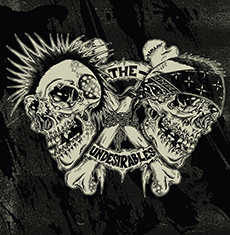


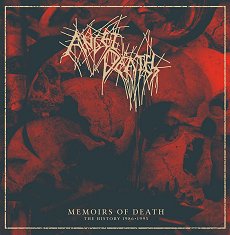





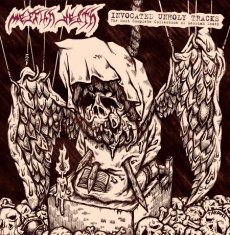
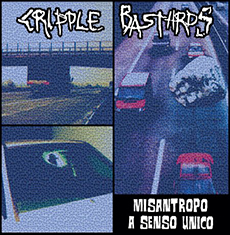
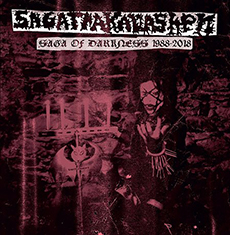



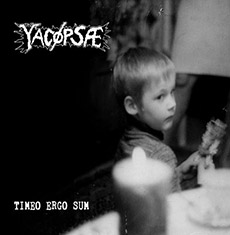

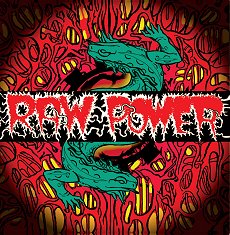


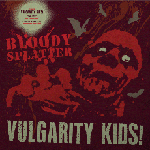
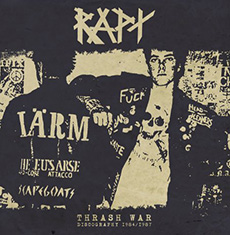
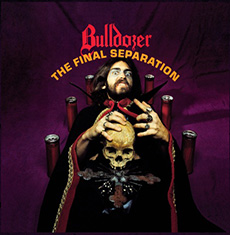


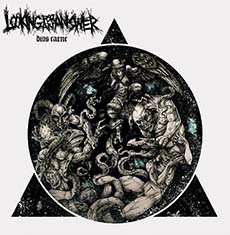

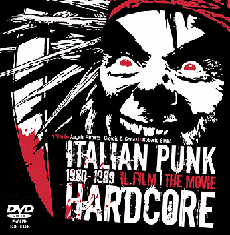

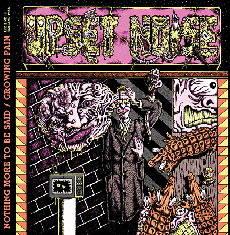

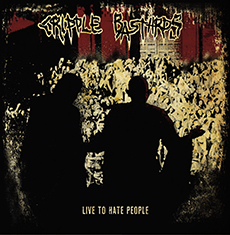

[…] Follow this link to place your order and read more about this EP and some background on its production and the early days of FEAR OF GOD. […]